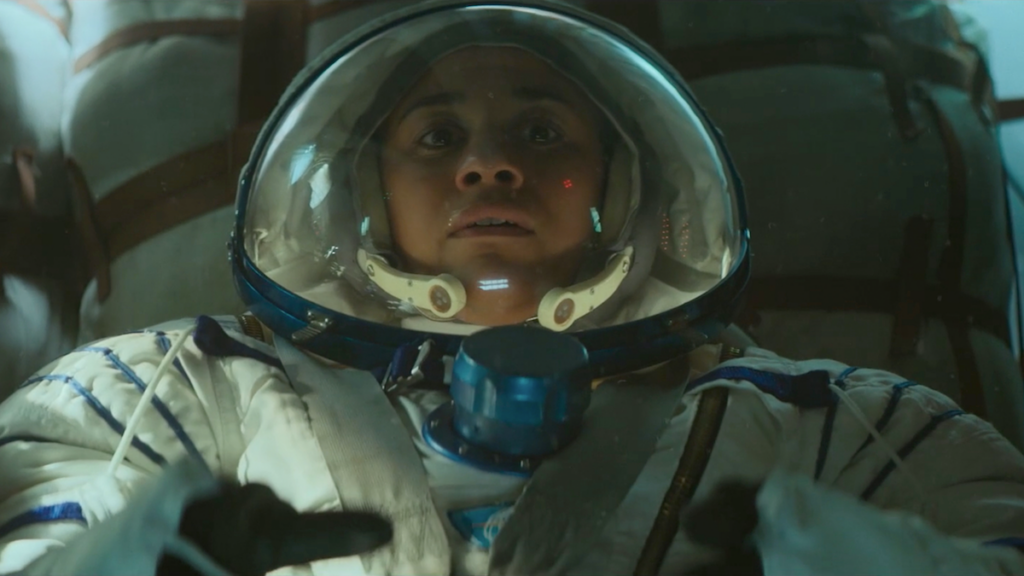‘I.S.S.’ Review: Ariana DeBose Outer-Space Thriller Is Respectable But Lifeless

- Oops!Something went wrong.Please try again later.
- Oops!Something went wrong.Please try again later.
While the Cold War has long been over a second one brews between the USA and Russia inside “I.S.S.,” Gabriela Cowperthwaite’s frustratingly broad yet stylish space thriller that just premiered at the Tribeca Film Festival.
Considering the growing political tensions between the two countries today, this is a movie one might be tempted to adorn with adjectives such as “timely” and “urgent.” Except “I.S.S.”—a title inexplicably fashioned with three periods—is too generic a genre exercise to matter, one that vaguely orbits notions such as trust, selflessness, teamwork and the hazards of blind nationalism with the most simplistic messages to transmit about them.
Working from a Blacklist script by debuting screenwriter Nick Shafir, Cowperthwaite’s pressure-cooker outing is set sometime in the near future, introducing us via an efficient title card to the brief history of the International Space Station (ISS), founded decades ago as a symbol of the collaboration between the US and Russian governments.
Today, the ISS is primarily a research facility covering advancements in medicine, technology and space exploration, occupied continually with a team of US astronauts and Russian cosmonauts. The film circles one such team of six scientists (three from each country) with an unexplained medical mission of curing some disease. The band find themselves at odds, though, when an earthbound war breaks out between their respective motherlands.
Also Read:
Tony Awards Hit Highest Viewership Since 2019, Up 2% From Last Year
On the American side there is the capable space newbie Dr. Kira Foster (the magnetic Ariana DeBose of “West Side Story”), Chris Messina’s charismatic and seasoned Gordon Barrett, as well as John Gallagher Jr.’s cagey and overtly homesick Christian Campbell. The Russian team consists of Masha Mashkova’s headstrong Weronika Vetrov, Pilou Asbæk’s intriguing Alexey Pulov and Costa Ronin’s veteran Nicholai Pulov.
In the footsteps of masterworks like “Gravity” and “Alien”—as well as the lesser-known and underseen “Life”—Shafir’s script initially attempts to familiarize us with the ins and outs of space living, economically establishing the dynamics of the crew. Sadly, his text can’t eschew certain cliches in these early moments, leaning too heavily on the group’s emotional baggage that followed them from Earth. But through the eyes of the rookie Kira, the story thankfully possesses some warm and captivating pull too, as Kira learns the basics of life at the station, from getting a good night’s sleep to sharing resources while maintaining a sense of privacy.
Elsewhere, there is some fun to be had with Shafir’s twisty structure. With each of the teams having received their own command—take control of the ISS by any means necessary—it looks like there would be a simple nationality divide between the characters. But allegiances shift and realities change when the communication system fails and Gordon finds himself in danger’s way while trying to repair it against all protocols. In the following moments, smaller breakout allyships form, the most notable one being between the station’s two female crew members.
Best known for her extraordinary and policy-shifting documentary “Blackfish,” about the cruel treatment and ill fate of the SeaWorld orcas, Cowperthwaite might at first seem in unfamiliar waters here. She slips right into this particularly specific cosmo, bringing along her proven tenacity, empathy and strong sense of place, qualities she openhandedly demonstrated not only in “Blackfish” but also the poignant real-life drama “Megan Leavey.”
Also Read:
Tribeca Festival 2023: See the Star-Studded Red Carpet Arrivals (Photos)
In that, “I.S.S.” feels sufficiently and organically claustrophobic when it leans into the mundanity of outer space containment. It also looks beautiful and impressively polished for a small project with ambitious genre aims. Shot grandly by cinematographer Nick Remy Matthews (who knows a thing or two about orchestrating claustrophobia if “Hotel Mumbai” is any indication), “I.S.S.” especially leaves a memorable visual mark when the aforesaid conflict erupts, sending Earth frighteningly ablaze on the astronauts’ tiny windows.
If only the same fire could have been ignited inside the station amid players who continually need to second guess collaborators, opponents and, in some cases, their own sanity. But despite the impossible stakes of their situation, the crew’s acts of backstabbing and self-sabotage feel curiously lifeless, bogged down by a completely unnecessary instance of on-the-job romance that comically comes out of nowhere.
Though, in fairness, the ensemble gives it their all with committed performances, from DeBose’s fish-out-of-Earth first-timer, John Gallagher Jr.’s unknowable Christian and “A Hijacking” actor Asbæk’s intimidating Pulov being the standouts. (DeBose successfully expanding her genre repertoire is especially encouraging to see.)
Cowperthwaite and Shafir don’t really have anything noteworthy to say about gender politics in this particular field of science. Though during a certain turn, their story comes dangerously close to teasing the stereotypical notion of female intuition. On the whole, their film squanders its small pockets of oxygen fast, never managing to register the weight of its menacingly high-stakes premise. The ending both fizzles and makes one wonder whether the material feels too rushed, thin and low-key, and if it would have been better served with a meatier run time, more patient and character driven. But as it stands, this “I.S.S.” feels respectably stuck in a failure to launch mode.
Also Read:
Elliot Page to Star in Family Reunion Drama ‘Close To You’

